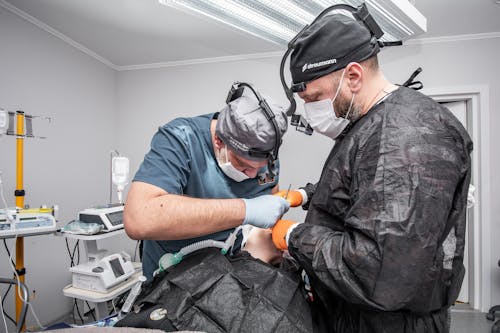The Future of Healthcare: How Technology is Changing the Health World
As an assistant in the healthcare industry, I am excited to share my insights on how technology is changing the future of healthcare. The healthcare industry is constantly evolving, and technology is playing a crucial role in this transformation. From telemedicine to artificial intelligence, technology is revolutionizing the way we approach healthcare. In this article, I will explore the impact of technology on the healthcare industry, and how it is changing the way we deliver care.
The Need for Change in Healthcare
The healthcare industry has been in need of change for a long time. Access to healthcare, quality of care, and cost of care have been major issues for decades. The traditional model of healthcare delivery has been reactive, meaning we wait for patients to get sick and then treat them. This model is not sustainable, and it is not effective in preventing chronic diseases.
With the rise of chronic diseases and an aging population, the healthcare industry needs to shift towards a proactive and preventative model. This is where technology comes in. Technology has the potential to transform healthcare delivery from reactive to proactive by empowering patients and healthcare providers with real-time data.
The Impact of Technology on Healthcare
Technology is having a profound impact on the healthcare industry. One of the most significant changes is the shift towards telemedicine and virtual health. Telemedicine allows healthcare providers to diagnose, treat, and monitor patients remotely. This can improve access to healthcare for people who live in rural or remote areas, and it can also reduce the cost of care.
Another area where technology is making a difference is wearables and health tracking devices. Wearables like Fitbit and Apple Watch allow patients to monitor their health in real-time, and provide healthcare providers with valuable data. This data can be used to identify health risks and prevent chronic diseases.
Telemedicine and Virtual Health
Telemedicine and virtual health are rapidly transforming the healthcare industry. Telemedicine allows healthcare providers to diagnose, treat, and monitor patients remotely. This can improve access to healthcare for people who live in rural or remote areas, and it can also reduce the cost of care.
Virtual health is another area where technology is making a difference. Virtual health refers to the use of technology to deliver healthcare services remotely. This includes telemedicine, as well as other forms of remote healthcare delivery like online consultations and virtual clinics.
Virtual health has the potential to revolutionize healthcare delivery by improving access to care, reducing costs, and increasing patient engagement. For example, virtual health can be used to provide mental health services to people who live in remote or underserved areas.
Wearables and Health Tracking Devices
Wearables and health tracking devices are becoming increasingly popular, and they are changing the way we approach healthcare. Wearables like Fitbit and Apple Watch allow patients to monitor their health in real-time, and provide healthcare providers with valuable data.
This data can be used to identify health risks and prevent chronic diseases. For example, if a patient’s wearable detects a high heart rate or low blood oxygen levels, healthcare providers can intervene before the patient experiences a medical emergency.
Wearables and health tracking devices also have the potential to improve patient engagement and adherence to treatment plans. Patients can use their wearables to track their progress and set goals, which can help them stay motivated and engaged in their healthcare.
Electronic Health Records and Patient Data
Electronic health records (EHRs) are another area where technology is making a difference in healthcare. EHRs are digital records of a patient’s medical history, including diagnoses, medications, and test results.
EHRs have the potential to improve patient outcomes by providing healthcare providers with timely and accurate information. For example, if a patient is admitted to the emergency department, their EHR can be accessed immediately, allowing healthcare providers to make informed decisions about their care.
EHRs also have the potential to improve population health by providing healthcare providers with valuable data. This data can be used to identify health trends and implement preventative measures.
Artificial Intelligence in Healthcare
Artificial intelligence (AI) is another area where technology is transforming the healthcare industry. AI refers to the use of computer algorithms to perform tasks that would normally require human intelligence.
In healthcare, AI can be used to analyze large datasets and identify patterns that can be used to improve patient outcomes. For example, AI can be used to identify patients who are at risk of developing chronic diseases, and intervene before the disease progresses.
AI can also be used to improve clinical decision-making by providing healthcare providers with data-driven insights. For example, AI can be used to analyze medical images and identify abnormalities that may have been missed by human analysis.
Read More: Capturing Life’s Moments: How Cameras Have Revolutionized Photography
Robotics and Automation in Healthcare
Robotics and automation are also transforming the healthcare industry. Robots are being used to perform surgical procedures, assist with rehabilitation, and even deliver medication.
Automation is being used to streamline administrative tasks, like scheduling appointments and processing insurance claims. This can reduce the burden on healthcare providers and improve the patient experience.
The Future of Healthcare Jobs
The rise of technology in healthcare is also changing the job market. Some jobs, like medical transcriptionists and medical record technicians, may become obsolete as EHRs become more common.
However, new jobs are also emerging in the healthcare technology field. These include roles like clinical informaticists, who analyze healthcare data, and healthcare data scientists, who use data to improve patient outcomes.
Ethical and Privacy Concerns in Healthcare Technology
As with any new technology, there are ethical and privacy concerns associated with healthcare technology. Patients may be hesitant to share their personal health data with healthcare providers, especially if they are concerned about how that data will be used.
There are also concerns about the use of AI in healthcare. Some people worry that AI may be used to make decisions that should be made by healthcare providers.
AI Helps Manage Patient Flow
- AI can help manage patient flow by tracking and predicting the length of stay for each patient. This will allow hospitals to better predict staffing needs, improve resource utilization, and reduce waiting times for patients.
- Artificial intelligence is also increasingly being used in healthcare to assist physicians with diagnosis and treatment recommendations. Hospitals like the Cleveland Clinic are already using IBM’s Watson AI system to help diagnose cancer, heart disease, and other diseases. The system provides access to a vast amount of medical data that can be analyzed by physicians at the push of a button.
- Robotics are also being used in healthcare fields such as surgery, nursing care, physical rehabilitation, and home caregiving tasks like bathing or meal preparation. Robots have been put to work assisting surgeons with complex surgical procedures such as prostatectomy or cardiac bypass surgeries by taking over tedious tasks like suturing or applying staplers while freeing up doctors’ hands, saving time, and reducing human error rates.
Conclusion
Technology is transforming the healthcare industry in many ways. From telemedicine to AI, technology has the potential to improve access to care, reduce costs, and improve patient outcomes.
As the healthcare industry continues to evolve, it is important for healthcare providers to stay up-to-date with the latest technology trends. This will require ongoing education and training, as well as a commitment to the ethical and responsible use of technology.
The future of healthcare is exciting, and I am honored to be a part of this transformational period in the healthcare industry.







[…] Read More: The Future of Healthcare: How Technology is Changing the Health World […]